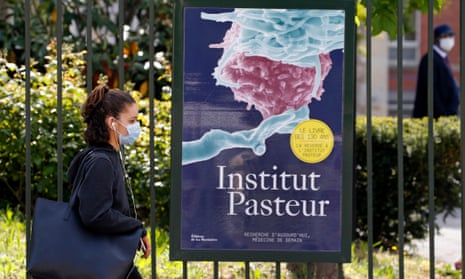A medical study in France suggests even mild cases of coronavirus infection, not requiring hospital treatment, produce antibodies in almost all patients, with the body’s defences against the virus increasing during the weeks of recovery.
The research, led by a team from the Pasteur Institute, raises hopes that everyone who has had the disease could acquire some degree of immunity, although it is not clear for how long or to what degree.
The question of immunity has become one of the most vexed issues concerning coronavirus, in terms of governments’ public health policies – including the controversial herd immunity route – and in the understanding of the mechanics of the disease, which divides scientists. Early reports had suggested an absence or limited presence of antibodies in some individuals with mild symptoms.
The research, jointly led by Olivier Schwartz, head of the Pasteur Institute’s virus and immunity unit, took samples from more than 160 staff from the CHU hospital, in Strasbourg, who became infected with Covid-19 early in March after a “super-propagation” event – linked to a five-day prayer and fasting gathering of the evangelical Christian Open Door church in Mulhouse, eastern France.
While most research into antibody production against coronavirus has examined patients with severe illness who have been admitted to hospital and then recovered, the Pasteur Institute team focused on the mild cases believed to make up about 80% of all the infections.
According to the research report posted on the medRXiv server, 160 hospital staff agreed to participate in the study, all having been confirmed as coronavirus cases after initial tests. They were not ill enough to be admitted to hospital. Two separate assay tests were then used to retest the staff to see if they had produced antibodies.
The first test was a commercially available one, while the second had been developed by the institute to identify the rate of seroconversion (the production of antibodies) and those antibodies’ ability to neutralise the virus.
The second test suggested that 99.4% of the people studied had produced antibodies; only one individual, a 58-year old man, had no antibodies detected.
The research noted that the detected antibody response appeared to grow stronger as the participants recovered and that the antibodies appeared effective in combating (or neutralising) the virus.
“The neutralising activity is present much later than the appearance of antibodies and this is encouraging,” Schwartz told the French newspaper Le Monde, adding that the team hoped to continue studying the participants to establish how long the protection would continue.
Schwartz’s study says: “We further report that the neutralisation activity of the serum increases with time, reaching 97% four weeks after the onset of symptoms. Therefore, it is a fair assumption that the majority of individuals with mild Covid-19 generate neutralising antibodies within a month after onset of symptoms.
“Although not yet demonstrated, several lines of evidence suggest that the presence of neutralising antibodies may be associated with protective immunity for Sars-CoV-2 infection.”
The study concludes: “For patients with [the related] Sars [coronavirus] antibodies persist for at least two years after symptomatic infection.”
The French report emerged on the same day researchers from the Chinese Academy of Sciences reported in the journal Nature that they had isolated and identified a monoclonal antibody from a recovering coronavirus patient, which appeared to show a strong ability to eliminate the virus in the trachea when used as a treatment, and to prevent the viral load from increasing there, when used prophylactically.
